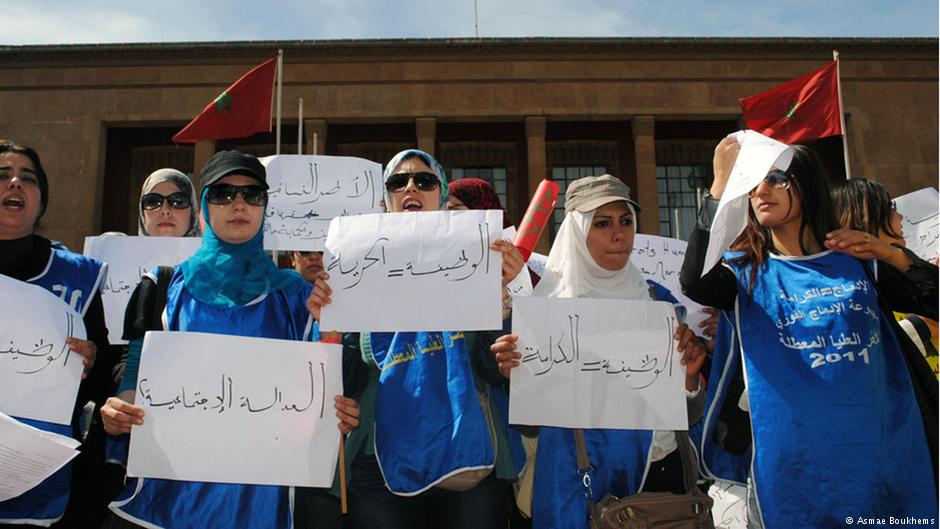MENA's generation jobless

The countries of the Middle East and North Africa are wasting their most important resource: youth. In a recent survey of 16 to 30-year-olds in eight countries across the region, 43% of respondents said they did not have job and were neither attending school nor university. Many had never had a job. Only one in five was gainfully employed.
Among young women, the share of the unemployed is particularly high. Nowhere in the world is female participation in the labour force as low as in the Middle East and North Africa.
In the past, the state apparatus used to serve as an overflow basin for the annual flood of young people newly entering the labour market. In view of reduced tax revenues and nascent structural reforms, the public sector is increasingly unable to play that role.
Furthermore, educational curricula mostly do not meet the requirements of the economy, especially those of private-sector industries. So it is unsurprising that recruiting companies pay more attention to work experience than to formal qualifications.
Few chances of long-term employment
To give young people any chance of a job at all, governmental labour-market programmes have been arranging internships in companies. This has been done in Tunisia, for instance, where the internships generally last twelve months. Apart from going to work, the participants attend training courses. State-funded wage supplements top up their income.
The government's aim is to offer a mixture of financial incentives and sanctions in order to motivate employers to provide long-term jobs for young people. Yet the programmes have had little impact on youth unemployment. Employers readily accept the state-subsidised trainees, but do not necessarily create more jobs.

Who gets an internship is another critical issue. Preference is given to young unemployed academics and graduates of higher education institutions, while the majority of young people with fewer academic qualifications are ignored.
One positive aspect, however, is that the programme targets young women and men equally. Similar programmes are also in operation in other countries of the Middle East and North Africa. Regardless of the conceptual shortcomings, the main problem is that these measures’ impact is limited from the outset – the companies concerned do not grow fast enough to be able to offer interns a prospect of long-term employment.
Start-up assistance and support for small businesses
Initiatives that help jobless young people become self-employed or start up micro‑businesses are arguably more effective than government-sponsored internships. A number of governments in the MENA region have adopted programmes to promote this cause. Participants receive free training and advice to prepare them for business and are eligible for grants that facilitate transitional funding.
There are also a number of international support programmes offering micro, small and medium enterprises (MSMEs) access to loans. Such initiatives take account of the fact that around 80% of people in gainful employment work for MSMEs or their own small business.
Lack of finance is a major obstacle to growth for many small businesses. Shortage of qualified labour and managerial skills is another. This bottleneck affects start-ups that receive special state support in many MENA countries.
Sales, business development and business leadership skills are particularly weak, so MSME support programmes that combine better access to credit with training opportunities generally promise to deliver the best results.
SMEs need to use the Internet more
One reason small and mid-sized enterprises are not tapping their full potential is that they hardly use the Internet. In Egypt, for example, a mere seven percent of MSMEs are online. Companies with stronger digital networks could increase exports and expand employment.Research in Turkey has revealed that the annual growth rates of MSMEs that use the Internet exceed those of their more conservative peers by a factor of seven. Programmes that aim to support young business should therefore emphasise digital skills and facilitate funding for investment in information and communication technology (ICT).
However, unless progress is made on eliminating structural development constraints, educational reform, labour market programmes and MSME support alone are not going to help reduce youth unemployment significantly. Because of the low level of growth in most MENA countries, new jobs are not created fast enough to meet the needs of a growing population. This is due not only to the political instability of the countries concerned. Another serious challenge is international competitiveness.
The productivity of businesses in Tunisia and Egypt, for instance, virtually did not increase over a 35-year assessment period. By contrast, firms in India, Mexico and Turkey doubled or trebled their productivity in the same time-frame. One reason, of course, that the digital economy is less developed than it is in other emerging markets. People with ICT skills are rare, and the digital infrastructure still has huge gaps.
Obstacles to free competition

The economic dynamism of the private sector is also hampered by obstacles to free competition. A handful of companies enjoy considerable privileges due to their good relations with government decision-makers.
These politically-linked enterprises have easier access to subsidised land purchases, bank loans or investments in economic sectors that are protected from foreign competition. In addition, there is ordinary corruption, which is a significant cost factor, especially for small and medium-sized enterprises.
Low economic diversification is another challenge. Except in the oil-rich Gulf monarchies, an average of one in three economically active people work in agriculture, but this sector accounts for only 12% of gross domestic product (GDP) today. The manufacturing sector's contribution to GDP in the MENA countries – at an average of only around 10% – is low and has been flat-lining or even declining for years.
This is due partly to the failure of the state-controlled industrialisation model launched in the 1960s and partly to the free trade agreement with the European Union, which has resulted in the loss of many jobs, especially in labour-intensive sectors. The majority of people in gainful employment work in services today – in jobs that require comparatively simple skills. Most workers have only low value-adding jobs, often in the informal sector.
Structural reforms to expand the private sector
Without broad-based economic growth, youth unemployment cannot be sustainably reduced. So, support for employment-intensive sectors such as MSME is vitally important. But it is not enough just to create more jobs; they also need to be better jobs. Otherwise, it will be impossible for a self-sustaining economic process to gain momentum.
It is striking that the region is largely unprepared to make use of digital technologies. This world region is at risk of falling even further behind in terms of international competitiveness, and that would exacerbate unemployment.
It is thus imperative that the education system should deliver more practical training geared to the needs of the economy, especially the private sector. Above all, an intermediate level of technical qualifications needs to be created. For this to happen, training courses in which digital competence and information and communication technologies are learnt need to be established. This also presupposes a re-thinking among young people, so that non-academic training programmes lose their stigma.
The integration of women in the labour market, which has already been initiated, is not just a matter of fairness. It is essential if the MENA countries are to realise their full economic potential.
Unless accompanied by structural reforms aimed at removing obstacles to private-sector development and competition and paving the way for economic diversification, the impact of educational reforms and labour market programmes will remain limited.
Nassir Djafari
© Development & Cooperation | D+C 2018
